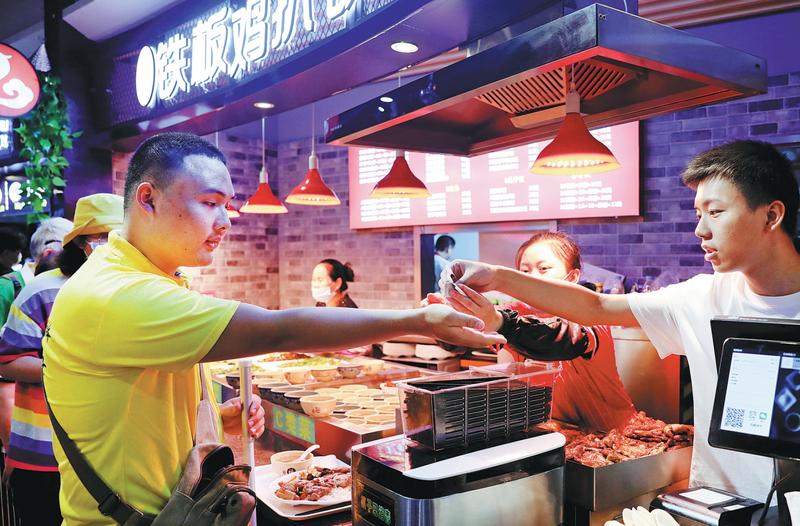 Ang Ziyu (left) pays for food as part of a life skills training activity organized for visually impaired students at a mall in Shanghai on Aug 14. (FANG ZHE / XINHUA)
Ang Ziyu (left) pays for food as part of a life skills training activity organized for visually impaired students at a mall in Shanghai on Aug 14. (FANG ZHE / XINHUA)
Ang Ziyu, who took the gaokao, the national college entrance exam, in the eastern province of Anhui has become quite a celebrity on social media in recent months.
The blind teenager won renown after scoring 635 points, 120 points higher than the local admission requirement for first-tier universities, and won a place at Minzu University of China in Beijing.
Ang Ziyu won renown after scoring 635 points, 120 points higher than the local admission requirement for first-tier universities, and won a place at Minzu University of China in Beijing
Born in April 2001 with impaired vision, Ang's sight gradually deteriorated and by the time he left primary school he was almost completely blind as a result of damage to his retinas. As an independent person, he learned to dress himself and eat unaided when he was young, and he can also fold clothes and even change his quilt cover.
His parents didn't know what his future would be like, but they tried to provide him with the best education possible.
"I decided to keep studying, even if I couldn't take the college entrance exam. I still wanted to read books and learn things," Ang said, adding that he was unwilling to bow to fate.
His family was given great hope in 2014, when Li Jinsheng, a 46-year-old from Central China's Henan province, became the first blind person to take the gaokao.
ALSO READ: Students set record as gaokao begins
It wasn't until last year, when Ang took the exam for the first time, that he actually touched the Braille exam paper.
Because blind candidates have to "read" the questions by touch, the duration of the exam can be extended by 50 percent.
However, the admission score is the same as for able-bodied candidates, and visually impaired candidates don't get extra points because of their disability.
Ang studied hard every day, getting up at 6:30 am and working until after midnight.
Whether converting a document into Braille or spending his evenings doing homework and revision, the effort was worth it, a fact reflected by his score when he took the gaokao again this year.
READ MORE: Changes help more disabled students to take gaokao
When Ang was enrolled by the university in Beijing, more than 1,000 kilometers from home, he decided to prepare himself because he knew he would face many new challenges.
He traveled to Yunnan province with friends for a week. Later, he visited Shanghai to take part in a summer camp hosted by a social welfare organization.
The participants, all visually impaired students about to enter universities, were learning to become more independent before starting college.
There are more than 17 million visually impaired people in China, with nearly 25 percent of them age 30 or younger, according to official data.


